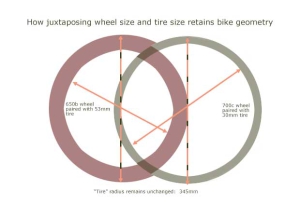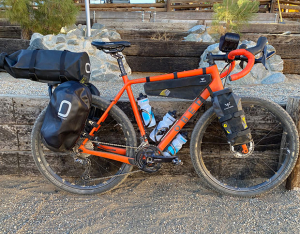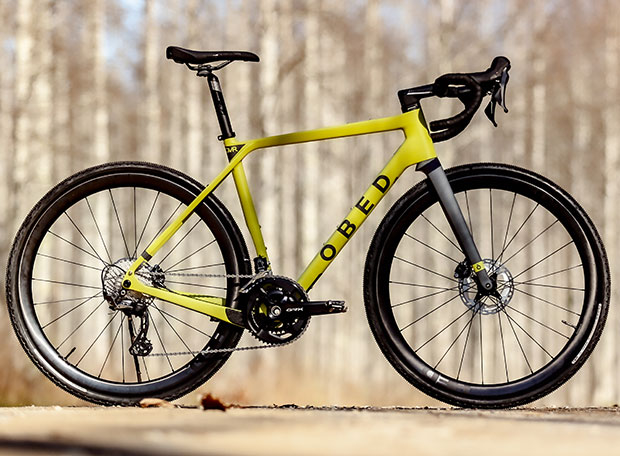
We almost don’t have a favorite triathlon bike company that doesn’t also make gravel bikes. I lay claim to gravel as part of multisport. (Sue me.) When one of “our” companies comes out with a new gravel bike I consider that as newsworthy as when they launch a tri bike. American Bicycle Group has 3 brands: Quintana Roo (my old job); Litespeed; and Obed. That last one is devoted to offroad, and while they make full MTB what I care about most are their gravel bikes.
They launched one today, which is the Obed GVR. There are things I like about this bike, and things that don’t work as well for me, selfishly. And to be clear my opinions are based on what I see in paper and on the computer screen; I have not seen one in the flesh which means I haven’t ridden a GVR.
The thesis driving the Obed GVR is speed, that is, a gravel bike optimized for speed, and quicker handling that would appeal to a driver with a leadfoot. To get that handling the bike was built with – among other things like a quicker steering geometry – “short chainstays”. And when I read that I kind of panicked because I’m a 1x guy, for gravel, and one of the featured groupsets for this bike is Campagnolo’s Ekar group. That’s a 1x13 and I really don’t like shorter chain stays on a 1x drivetrain, because of the friction you get in a heavily cross-chained gear. So, I went right to the geometry chart to find that the chain stay in an Obed GVR is 425mm, and was relieved. That’s still a lot of chain stay: plenty for a 1x. “Shorter” is relative, and the Obed Boundary has a chain stay of 435mm.
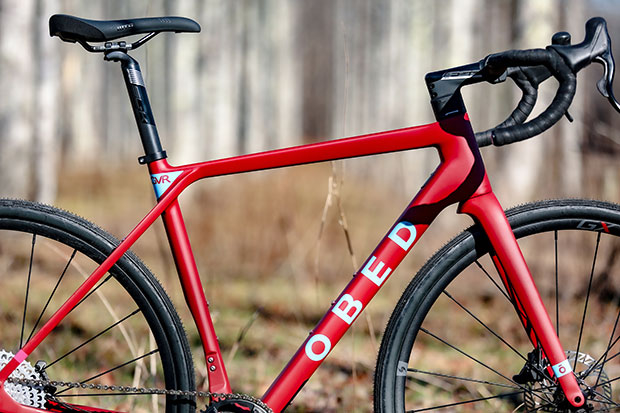
The bike has the same routing scheme as my Quintana Roo SRsix, with FSA’s stem and headseat that captures all the routing internally. I also have FSA’s K-Wing AGX handlebar on my aero road bike, and that’s a gravel handlebar. In fact, the Ekar-built model has this very handlebar on it. But hey, I told you I’m particular about my gravel bikes and might not choose internally routed hydraulics. But that’s me. One of your very favorite gravel bikes is Cervelo’s Áspero-5 and that bike’s hydraulics are internal as well. If you really do not want internal cable routing let the ABG folks know at the point of order, they'll swap in a different fork and you can route your hydraulics externally. In this case there is a hose port at the top of the (subbed-in) fork crown. On the frame's down tube is a motif I've begun to see: an opening with several port types, one of which is a solid door for complete internal routing. A hose port for external routing is subbed for this door for external routing.
The GVR has available bosses for rear racks for the bikepackers, and three bottle cage bosses. What I’ve found in my bikepacking investigations is that bosses that get your down tube bottle low, and your seat tube bottle high, give you frame pack options you wouldn’t otherwise have.
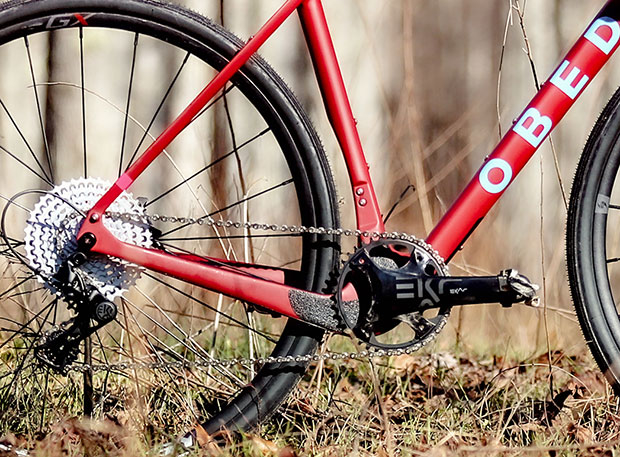
But let’s talk about bikepacking, because my bike for that is also an Obed, just, it’s the Obed Boundary. That bike has 650B wheels on it, and 53mm tires, and the GVR is really built for more high-speed riding. It seems to me the GVR is optimized for 700c wheels and the max stated clearance is 47mm. For my own gravel riding I’m not a fan of tire size (for reasons I’ve explained), but this bike lets you have that large a tire if you want. Because of everything about this bike – attention to aerodynamics, fast handling – I suspect most folks who’ll choose this bike engage in higher speed gravel grinding, as in, a lot of sustained 20mph segments. That owner’s bike will have tires between 35mm and 40mm (like the Panaracer Gravel King in 38mm, one of the options for this bike).
I’ll fall back on my (fairly recent) old saying: you have to decide what gravel means to you. Where I live it’s sandy washes; rocky descents; very steep climbs with bad traction; or pavement. My “gravel” loops are best ridden with a bike change, from road to MTB and back again. Because of this, I’ll stick with my Obed Boundary. But, I’ve raced gravel in different parts of the country and were I to live in the Midwest, Plains states, Great Lakes, it would be this new GVR, because I’d be on 700c wheels and 30-something-millimeter tires.
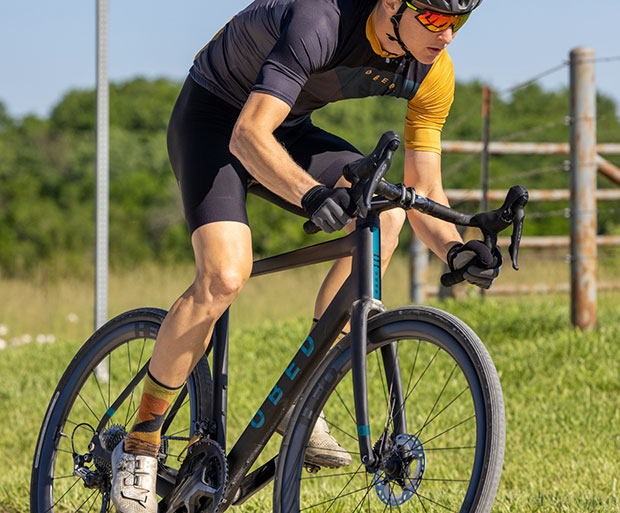
This company paints and assembles everything in its Chattanooga factory, so you get an experience kind of like Trek’s Project One, but it’s omni-sales-channel bends more toward B2C. Because of this, there’s a freedom in what you want in color and spec, and the way you get your bike. Your doorbell will ring and it’s either a UPS driver handing you a box; or a Kitzuma driver handling you a built, ready-to-ride, bike. But can I give my friends at American Bicycle Group a little nudge? I wrote about Fit Ready some months back, and how I view this as a huge leap forward in our industry and a big head start that this company owns. This is industry leading. But it’s limited to the newly launched V-PR tri bike. I think this bike is a great candidate for Fit Ready, and I hope, once ABG gets its arms fully around the execution of Fit Ready that it becomes available for the GVR.
That said, you can choose your stem length in the configurator when ordering this bike. That's a big deal with internal hydraulics, because you don't have as much wiggle room with hose length. You want to order this bike with the stem you need, and I'll see if I can get our expert fitters in our Quintana Roo Fit Assistance thread to help you get the Obed GVR in the size, stem length, and stem spacer config that you want, if that's a pain point for you. (There's a process for this.)
I’ve been awaiting my Campy Ekar group for many months now and hope it’s coming soon. You can get this bike with that groupset now, it looks like, for $4,945 if you don’t choose any of the available upgrades. The bike starts in the $3000s for mechanical drivetrains, and goes up from there. It’s available with Shimano electronic. But I’m kind of partial to the Ekar build as you might glean. The bike is viewable here, play around in the configurator to see how you make it yours.

